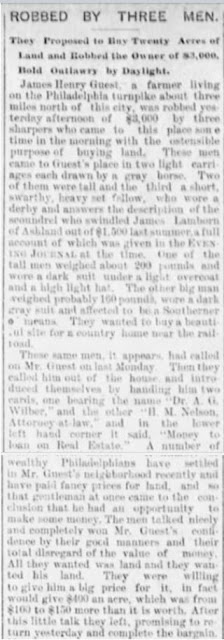 |
| The location of Chandler Lamborn's farm |
We'll get to the new story in a moment, but first let's catch up and find out exactly what happened to Chandler Lamborn. All we knew from the Eastburn article was that three days after failing with him, the swindlers succeeded in taking $500 from Lamborn. They left the area soon thereafter. The article below gives a detailed account of just what went down that day. It appeared the same day as the Eastburn article, July 14,1888, but in a different paper, the Wilmington Every Evening. It was all a complex scheme to get the 71 year old Lamborn to gather a substantial amount of money together so that they could steal it, literally, right out of his hands.
Unless I miss my guess, I'd say there's one small detail omitted from the story. What makes more sense, and is similar to things today like the Nigerian scam, is that "Powell" probably offered Lamborn a cut of the winnings for putting up the $500. From what I can tell from inflation calculators, that $500 would be equivalent to over $12,000 today. Not bad for a day's work. Except for the fact that it's immoral, illegal, and reprehensible. A pretty complicated scheme just to get the victim to gather up cash, and in principle similar to what they did again a few months later. This article appeared in the October 25th edition of the Evening Journal. (Reminder that you can click on the image for a larger version and easier reading.)
I realize this article was a bit longer, so if you didn't read the whole thing, here's essentially what happened. Three men, at least one of whom was likely "Mr. Powell" from the Lamborn robbery, approached Brandywine Hundred farmer James Henry Guest about purchasing a piece of his land in order to build a summer home. Guest's farm sat on the east side of Philadelphia Pike, just north of Bellefonte (which would spring up twenty-some years later), on what's now Guest Lane. For those who know the area, his house was (and maybe still is) just above the Brandywine Boulevard-Duncan Road intersection, near Mount Pleasant Elementary School.
The strangers offered to pay an excellent price for the land, and Guest agreed to the sale. The shady buyers stated that they had some of the agreed-upon price with them, but had to retrieve the rest. They thought it wasn't fair that they should put up money while Guest put up none, so they asked that he match their $3000 to assure that he wouldn't sell the land to someone else in the meantime. I find this a little weird since there's no indication that Guest was even looking to sell the land prior to their arrival, but he agreed to their terms.
Since Guest didn't have that much cash on hand, he needed to go to the bank in Wilmington to withdraw the amount. He and "Powell" drove to the Union Bank in town, withdrew the cash and headed home. They met met the other two cons along the pike, probably somewhere near where Washington Street Extension and, ironically, State Police Troop 1 is today. Long story short, the bunco steerers snatched Guest's money and escaped. That $3000 would be worth about $75,000 today. Ouch. Now for the MCH connection.
Right after the robbery, a neighboring farmer came by and helped Guest, accompanying him to the police station in Wilmington. This farmer was none other than John W. Banks, who happened to have grown up just outside of Stanton. His brother Jabez later operated the hotel at the Brandywine Springs Amusement Park, and both were featured in an earlier post about some old family invitations. In fact, the last invitation was for an Evening Party at John's house at Riverside in November 1884. And as for the person connection I mentioned, Guest's house is about a two minute drive from where I now live. I also have a family member who lives on what was the Guest farm, literally (if you have a good arm) a stone's throw from the house.
So it seems that either we just happened to come across these incidents, or 1888 was a good year for "sharpers" in New Castle County. And next time you get a suspicious phone call or email, remember that there have always been people looking to make a quick buck by separating hard-working folks from their money.





